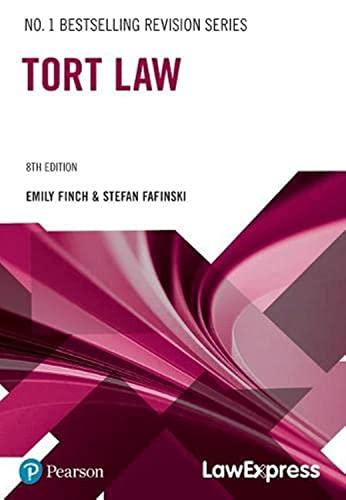Question
QUESTIONS: Bankruptcy laws provide procedures supervised by federal courts for dealing with insolvent debtors.Such laws ensure that a debtor's property is fairly distributed to its
QUESTIONS:
Bankruptcy laws provide procedures supervised by federal courts for dealing with insolvent debtors.Such laws ensure that a debtor's property is fairly distributed to its creditors, prevent some creditors from obtaining an unfair advantage over other creditors, protect creditors against actions by debtors that diminish the debtor's assets, provide debtors with protection against creditors' demands for payment, and give debtors a fresh start.
The Bankruptcy Code provides for several different types of bankruptcy proceedings, including straight bankruptcy (liquidations), reorganizations, consumer debt adjustments, and bankruptcies involving family farms and fishing operations.Each type of bankruptcy proceeding has its own advantages and disadvantages, and follows its own procedure.
1) Which type of bankruptcy proceeding can be initiated only by a debtor filing a voluntary petition for bankruptcy?
A) Chapter 11.
B) All types of bankruptcy proceedings.
C) Both Chapter 7 and Chapter 11.
D) Chapter 7.
E) Chapter 13.
2) Which is an advantage of a bankruptcy proceeding under Chapter 7 of the Bankruptcy Code?
A) The debtor is able to keep all of its assets and discharge all of its debts.
B) The debtor remains in business and debts are liquidated through implementation of approved reorganization plan.
C) Special treatment of family farmers and fishermen.
D) The debtor has the opportunity to work out of primarily consumer debt over a period of time (usually 3-5 years) through the implementation of an approved plan.
E) After liquidation and distribution of assets, most or all debts may be discharged and the debtor gets a fresh start.
3) The debtor's interest in which of the following types of property is not exempt from the bankruptcy estate under federal law?
A) The debtor's household furnishings.
B) The debtor's motor vehicle.
C) The debtor's household goods.
D) The debtor's collection of art by unrelated artists.
E) The debtor's residence.
4) Which type of bankruptcy proceeding would a company use to work out a plan for reorganizing the company's finances and avoiding going out of business?
A) Chapter 7.
B) Chapter 13.
C) Chapter 11.
D) All types of bankruptcy proceedings.
E) Chapter 12.
5) Which is an advantage of a bankruptcy proceeding under Chapter 11 of the Bankruptcy Code?
A) The debtor remains in business and debts are liquidated through implementation of approved reorganization plan.
B) Special treatment of family farmers and fishermen.
C) The debtor is able to keep all of its assets and discharge all of its debts.
D) After liquidation and distribution of assets, most or all debts may be discharged and the debtor gets a fresh start.
E) The debtor has the opportunity to work out of primarily consumer debt over a period of time (usually 3-5 years) through the implementation of an approved plan.
6) The debtor's interest in which of the following types of property isnotexempt from the bankruptcy estate under federal law?
A) The debtor's commercial real estate.
B) Funds in the debtor's tax-exempt retirement accounts.
C) Life insurance contracts.
D) The debtor's government benefits (e.g., social security).
E) The debtor's personal jewelry.
7) Which of the following is not a type of priority claim under the Bankruptcy Code?
A) Claims for the debtor's personal consumer debt.
B) Claims for administrative expenses and fees of the bankruptcy estate.
C) Claims for wages for the debtor's employees earned within six months of filing the petition for bankruptcy.
D) Claims for the debtor's domestic support obligations (e.g., alimony, child support).
E) Claims for goods sold to debtor in the ordinary course of business received by a debtor within20 daysbefore the petition was filed.
8) Which type of bankruptcy proceeding can be initiated by a creditor filing an involuntary petition for bankruptcy?
A) Chapter 11.
B) All types of bankruptcy proceedings.
C) Chapter 13.
D) Both Chapter 7 and Chapter 11.
E) Chapter 7.
9) Which is an advantage of a bankruptcy proceeding under Chapter 13 of the Bankruptcy Code?
A) The debtor remains in business and debts are liquidated through implementation of approved reorganization plan.
B) The debtor is able to keep all of its assets and discharge all of its debts.
C) Special treatment of family farmers and fishermen.
D) The debtor has the opportunity to work out of primarily consumer debt over a period of time (usually 3-5 years) through the implementation of an approved plan.
E) After liquidation and distribution of assets, most or all debts may be discharged and the debtor gets a fresh start.
10) Debtorscannotavoid security interests or judicial liens for which of the following types of property?
A) The debtor's personal jewelry and apparel.
B) The debtor's trade tools.
C) The debtor's household goods.
D) The debtor's vacation home.
E) The debtor's household furnishings.
Step by Step Solution
There are 3 Steps involved in it
Step: 1

Get Instant Access to Expert-Tailored Solutions
See step-by-step solutions with expert insights and AI powered tools for academic success
Step: 2

Step: 3

Ace Your Homework with AI
Get the answers you need in no time with our AI-driven, step-by-step assistance
Get Started


